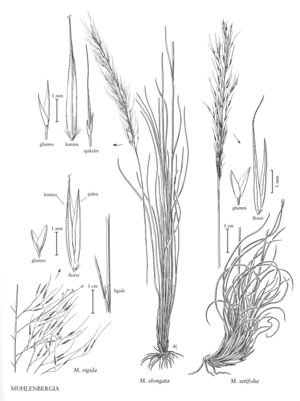Muhlenbergia elongata
Plants perennial; cespitose, not rhizomatous. Culms 40-120 cm, erect, not conspicuously branched; internodes mostly smooth, sometimes scabridulous below the nodes. Sheaths longer than the internodes, smooth or scabridulous, rounded towards the base, not becoming spirally coiled when old; ligules 2-8 mm, firm below, membranous distally, obtuse to acute; blades 15-50 cm long, 0.3-1.5 mm wide, flat to involute, smooth or scabridulous abaxially, hirtellous adaxially. Panicles 15-50 cm long, 1-7 cm wide, loosely contracted, not dense; primary branches 1-8 cm, appressed or diverging up to 30° from the rachises, naked basally; pedicels 1.3-8 mm, hispidulous. Spikelets 3-4.2 mm. Glumes subequal, 2-3 mm, exceeded by the florets, glabrous below, minutely pubescent or scabridulous distally, 1-veined, acuminate to acute, unawned or awned, awns to 1.6 mm; lemmas 2.8-4.2 mm, narrow, lanceolate, calluses hairy, hairs to 1 mm, lemma bodies glabrous and smooth below, scabridulous distally, apices acuminate, awned, awns 8-40 mm, straight to flexuous, demarcation of the awns from the lemma bodies not evident; paleas 2.8-4.2 mm, narrowly lanceolate, glabrous, acuminate; anthers 1.4-2.2 mm, yellow. Caryopses 2-2.2 mm, fusiform, brownish. 2n = unknown.
Discussion
Muhlenbergia elongata grows on rock outcrops, cliffs, canyon walls, and moist rock walls, on rhyolitic and volcanic conglomerates, at elevations of 850-2100 m. It extends south from Arizona into northern Mexico.
Selected References
None.
